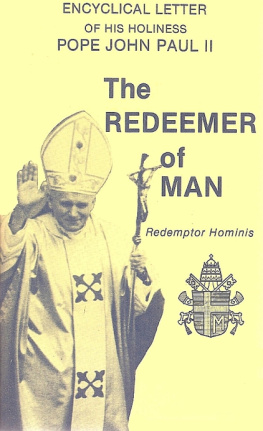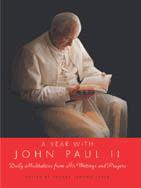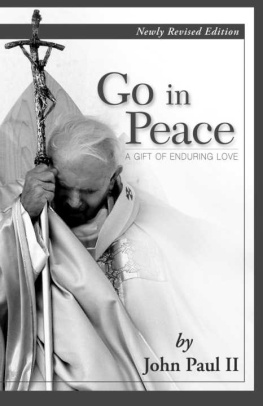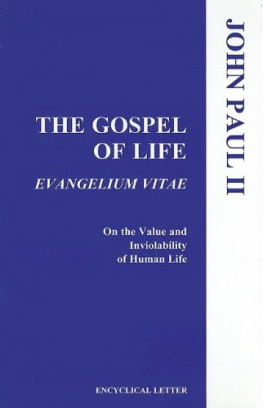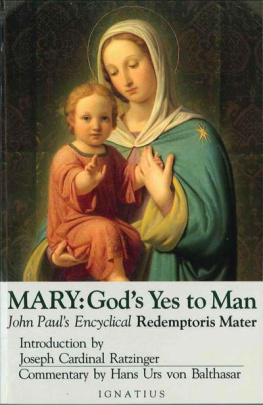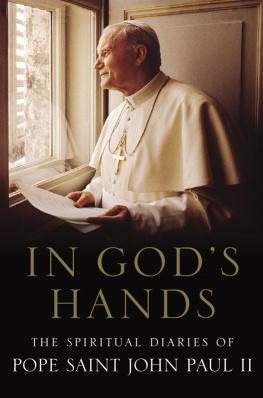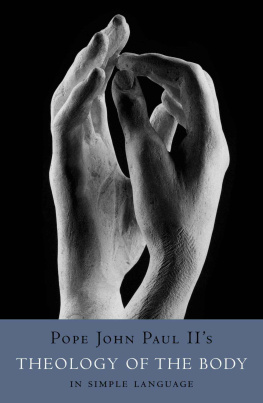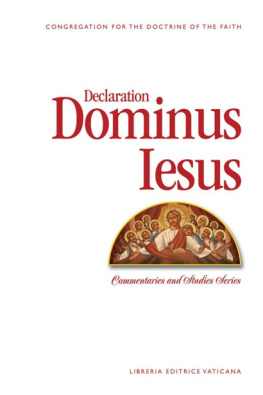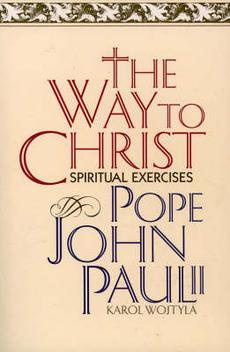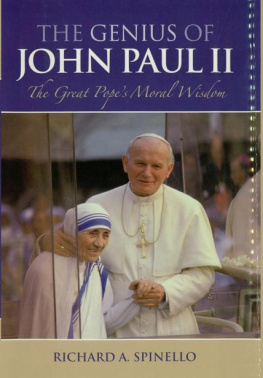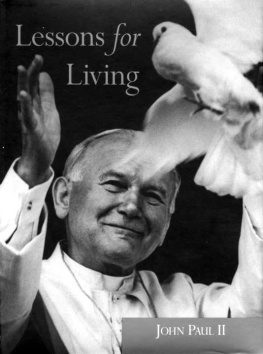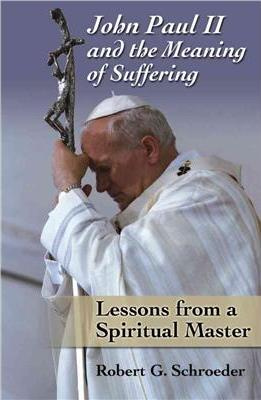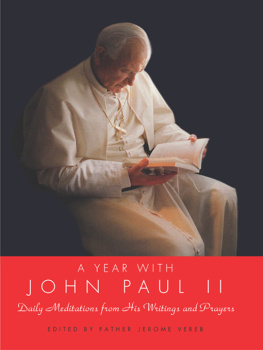Pope John Paul II - Redemptor Hominis: The Redeemer of Man
Here you can read online Pope John Paul II - Redemptor Hominis: The Redeemer of Man full text of the book (entire story) in english for free. Download pdf and epub, get meaning, cover and reviews about this ebook. year: 1974, publisher: Pauline Books & Media, genre: Religion. Description of the work, (preface) as well as reviews are available. Best literature library LitArk.com created for fans of good reading and offers a wide selection of genres:
Romance novel
Science fiction
Adventure
Detective
Science
History
Home and family
Prose
Art
Politics
Computer
Non-fiction
Religion
Business
Children
Humor
Choose a favorite category and find really read worthwhile books. Enjoy immersion in the world of imagination, feel the emotions of the characters or learn something new for yourself, make an fascinating discovery.
- Book:Redemptor Hominis: The Redeemer of Man
- Author:
- Publisher:Pauline Books & Media
- Genre:
- Year:1974
- Rating:5 / 5
- Favourites:Add to favourites
- Your mark:
- 100
- 1
- 2
- 3
- 4
- 5
Redemptor Hominis: The Redeemer of Man: summary, description and annotation
We offer to read an annotation, description, summary or preface (depends on what the author of the book "Redemptor Hominis: The Redeemer of Man" wrote himself). If you haven't found the necessary information about the book — write in the comments, we will try to find it.
Redemptor Hominis: The Redeemer of Man — read online for free the complete book (whole text) full work
Below is the text of the book, divided by pages. System saving the place of the last page read, allows you to conveniently read the book "Redemptor Hominis: The Redeemer of Man" online for free, without having to search again every time where you left off. Put a bookmark, and you can go to the page where you finished reading at any time.
Font size:
Interval:
Bookmark:
The Redeemer of ManPope John Paul II
To his Venerable Brothers in the Episcopate, the Priests, the Religious Families, the Sons and Daughters of the Church, and to all men and women of good will.
Venerable Brothers and Dear Sons and Daughters, Greetings and Apostolic Blessing.
The Redeemer of Man, Jesus Christ, is the center of the universe and of history. To him go my thoughts and my heart in this solemn moment of the world that the Church and the whole family of present-day humanity are now living. In fact, this time, in which God in his hidden design has entrusted to me, after my beloved Predecessor John Paul I, the universal service connected with the Chair of Saint Peter in Rome, is already very close to the year 2000. At this moment it is difficult to say what mark that year will leave on the face of human history or what it will bring to each people, nation, country and continent, in spite of the efforts already being made to foresee some events. For the Church, the People of God spread, although unevenly, to the most distant limits of the earth, it will be the year of a great Jubilee. We are already approaching that date, which, without prejudice to all the corrections imposed by chronological exactitude, will recall and reawaken in us in a special way our awareness of the key truth of faith which Saint John expressed at the beginning of his Gospel: "The Word became flesh and dwelt among us,"[1] and elsewhere: "God so loved the world that he gave his only Son, that whoever believes in him should not perish but have eternal life."[2]
2. We also are in a certain way in a season of a new Advent, a season of expectation: "In many and various ways God spoke of old to our fathers by the prophets; but in these last days he has spoken to us by a Son...,"[3] by the Son, his Word, who became man and was born of the Virgin Mary. This act of redemption marked the high point of the history of man within God's loving plan. God entered the history of humanity and, as a man, became an actor in that history, one of the thousands of millions of human beings but at the same time Unique! Through the Incarnation God gave human life the dimension that he intended man to have from his first beginning; he has granted that dimension definitively--in the way that is peculiar to him alone, in keeping with his eternal love and mercy, with the full freedom of God--and he has granted it also with the bounty that enables us, in considering the original sin and the whole history of the sins of humanity, and in considering the errors of the human intellect, will and heart, to repeat with amazement the words of the Sacred Liturgy: "O happy fault... which gained us so great a Redeemer!"[4]
3. It was to Christ the Redeemer that my feelings and my thoughts were directed on 16 October of last year, when, after the canonical election, I was asked: "Do you accept?" I then replied: "With obedience in faith to Christ, my Lord, and with trust in the Mother of Christ and of the Church, in spite of the great difficulties, I accept." Today I wish to make that reply known publicly to all without exception, thus showing that there is a link between the first fundamental truth of the Incarnation, already mentioned, and the ministry that, with my acceptance of my election as Bishop of Rome and Successor of the Apostle Peter, has become my specific duty in his See.
4. I chose the same names that were chosen by my beloved Predecessor John Paul I. Indeed, as soon as he announced to the Sacred College on 26 August 1978 that he wished to be called John Paul--such a double name being unprecedented in the history of the Papacy--I saw in it a clear presage of grace for the new pontificate. Since that pontificate lasted barely 33 days, it falls to me not only to continue it but in a certain sense to take it up again at the same starting point. This is confirmed by my choice of these two names. By following the example of my venerable Predecessor in choosing them, I wish like him to express my love for the unique inheritance left to the Church by Popes John XXIII and Paul VI and my personal readiness to develop that inheritance with God's help.
5. Through these two names and two pontificates I am linked with the whole tradition of the Apostolic See and with all my Predecessors in the expanse of the twentieth century and of the preceding centuries. I am connected, through one after another of the various ages back to the most remote, with the line of the mission and ministry that confers on Peter's See an altogether special place in the Church. John XXIII and Paul VI are a stage to which I wish to refer directly as a threshold from which I intend to continue, in a certain sense together with John Paul I, into the future, letting myself be guided by unlimited trust in and obedience to the Spirit that Christ promised and sent to his Church. On the night before he suffered he said to his apostles: "It is to your advantage that I go away, for if I do not go away, the Counsellor will not come to you; but if I go, I will send him to you."[5] "When the Counsellor comes, whom I shall send to you from the Father, even the Spirit of truth, who proceeds from the Father, he will bear witness to me; and you also are witnesses, because you have been with me from the beginning."[6] "When the Spirit of truth comes, he will guide you into all the truth; for he will not speak on his own authority, but whatever he hears he will speak, and he will declare to you the things that are to come."[7]
6. Entrusting myself fully to the Spirit of truth, therefore, I am entering into the rich inheritance of the recent pontificates. This inheritance has struck deep roots in the awareness of the Church in an utterly new way, quite unknown previously, thanks to the Second Vatican Council, which John XXIII convened and opened and which was later successfully concluded and perseveringly put into effect by Paul VI, whose activity I was myself able to watch from close at hand. I was constantly amazed at his profound wisdom and his courage and also by his constancy and patience in the difficult postconciliar period of his pontificate. As helmsman of the Church, the bark of Peter, he knew how to preserve a providential tranquillity and balance even in the most critical moments, when the Church seemed to be shaken from within, and he always maintained unhesitating hope in the Church's solidity. What the Spirit said to the Church through the Council of our time, what the Spirit says in this Church to all the Churches[8] cannot lead to anything else--in spite of momentary uneasinesses--but still more mature solidity of the whole People of God, aware of their salvific mission.
7. Paul VI selected this present day consciousness of the Church as the first theme in his fundamental Encyclical beginning with the words Ecclesiam Suam. Let me refer first of all to this Encyclical and link myself with it in this first document that, so to speak, inaugurates the present pontificate. The Church's consciousness, enlightened and supported by the Holy Spirit and fathoming more and more deeply both her divine and her human mission, and even her human weaknesses this consciousness is and must remain the first source of the Church's love, as love in turn helps to strengthen and deepen her consciousness. Paul VI left us a witness of such an extremely acute consciousness of the Church. Through the many things, often causing suffering, that went to make up his pontificate he taught us intrepid love for the Church, which is, as the Council states, a "sacrament or sign and means of intimate union with God, and of the unity of all mankind."[9]
8. Precisely for this reason, the Church's consciousness must go with universal openness, in order that all may be able to find in her "the unsearchable riches of Christ"[10] spoken by the Apostle of the Gentiles. Such openness, organically joined with the awareness of her own nature and certainty of her own truth, of which Christ said: "The word which you hear is not mine but the Father's who sent me,"[11]! is what gives the Church her apostolic, or in other words her missionary, dynamism, professing and proclaiming in its integrity the whole of the truth transmitted by Christ. At the same time she must carry on the dialogue that Paul VI, in his Encyclical Ecclesiam Suam called "the dialogue of salvation," distinguishing with precision the various circles within which it was to be carried on.[12] In referring today to this document that gave the program of Paul VI's pontificate, I keep thanking God that this great Predecessor of mine, who was also truly my father, knew how to display ad extra, externally, the true countenance of the Church, in spite of the various internal weaknesses that affected her in the postconciliar period. In this way much of the human family has become, it seems, more aware, in all humanity's various spheres of existence, of how really necessary the Church of Christ, her mission and her service are to humanity. At times this awareness has proved stronger than the various critical attitudes attacking ab intra, internally, the Church, her institutions and structures, and ecclesiastics and their activities. This growing criticism was certainly due to various causes and we are furthermore sure that it was not always without sincere love for the Church. Undoubtedly one of the tendencies it displayed was to overcome what has been called triumphalism, about which there was frequent discussion during the Council. While it is right that, in accordance with the example of her Master, who is "humble in heart,"[13] the Church also should have humility as her foundation, that she should have a critical sense with regard to all that goes to make up her human character and activity, and that she should always be very demanding on herself, nevertheless criticism too should have its just limits. Otherwise it ceases to be constructive and does not reveal truth, love and thankfulness for the grace in which we become sharers principally and fully in and through the Church. Furthermore such criticism does not express an attitude of service but rather a wish to direct the opinion of others in accordance with one's own, which is at times spread abroad in too thoughtless a manner.
Next pageFont size:
Interval:
Bookmark:
Similar books «Redemptor Hominis: The Redeemer of Man»
Look at similar books to Redemptor Hominis: The Redeemer of Man. We have selected literature similar in name and meaning in the hope of providing readers with more options to find new, interesting, not yet read works.
Discussion, reviews of the book Redemptor Hominis: The Redeemer of Man and just readers' own opinions. Leave your comments, write what you think about the work, its meaning or the main characters. Specify what exactly you liked and what you didn't like, and why you think so.

